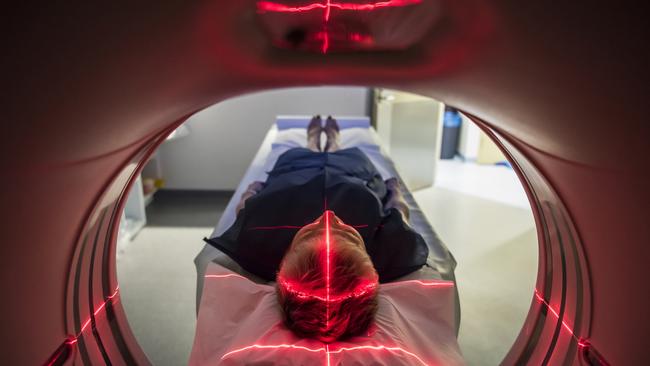Healthscope overplays its hand in act of self-destruction
Australians are sick of having their health being used as a bargaining chip as hospitals and insurers face losing it all.

Business
Don't miss out on the headlines from Business. Followed categories will be added to My News.
Private healthcare must take the cake as one of the most self-destructive industries going, with insurers and hospitals now regularly using their customers as a bargaining chip.
However, hospital major Healthscope will quickly find that this time it has overplayed its hand.
There have always been robust funding talks between hospitals and private insurers but that all happened behind closed doors where they rightly belong. Since the Covid-19 pandemic, these disputes have spilt out into the open and long-suffering members are becoming collateral damage. And they are sick of this.
The latest stoush takes it all to another level. Healthscope’s decision to next year tear up an agreement with health funds that represent more than 6.5 million Australians smacks of financial vandalism.
By doing this, Healthscope has attempted to leverage the health of hardworking Australians as a way to strike a better deal.
Had the health funds rolled over, every one of these members would have faced the choice of simply opting out of private health rather than keep paying never-ending premium increases. It’s unlikely they would return and this puts more pressure on an already stretched public health system.
For its part, Healthscope argues other big insurers Medibank, NIB and HCF have all agreed to new funding deals.

Even as Healthscope claims it is the holdout health funds which aren’t paying their fair share, particularly around ballooning wages bills, this is going to be a hard argument for the hospital to win in public.
The health network is owned by Canadian asset giant Brookfield, which has more than $US900bn ($1.3 trillion) in assets under its control around the world. Brookfield was behind last year’s failed $20bn bid for Origin Energy.
This time, Healthscope has taken on UK-headquartered Bupa, which counts millions of Australians as members following several acquisitions here including big funds HBF and MBF.
More damaging, the latest fight sees Healthscope cutting ties with an alliance which negotiates on behalf of dozens of small to mid-sized health insurers.
Many of these are not for profit or community-based funds which collectively represent 2.5 million people of whom many are low and middle-income workers.
Among the small funds Healthscope is breaking up with are those which represent police (Police Health), army (Defence Health), navy (Navy Health) and their families. Other funds cover nurses (Nurses Midwives Health), teachers (TUH) as well as funds representing the interests of those living in regional Australia (Mildura Health Fund).
Without a funding deal, each of these members – police, ex-services and nurses – are set to cop steep bills to be paid from their own pocket to cover the cost of their hospital stay. Bad move Healthscope.
The brinkmanship is part of an increasing pattern of tough negotiation on Healthscope’s part.
Just last month, Healthscope outlined plans to charge members of several health funds – including Bupa – a “hospital facility fee” of $50 for same-day services and $100 for overnight stays. It urged millions of members impacted by the funds to switch providers if they were affected by the fee.

Elsewhere, NIB and St Vincent’s Health had threatened to tear up a funding deal. It was only at the very last minute that a resolution was signed.
The reason behind getting to this situation is that Covid-19 has resulted in annual funding negotiations getting uglier and uglier.
Elective surgery was forced to shut down, and many private hospitals almost went bust for lack of patients. On the other hand, health funds were major winners during Covid-19. They generated windfall profits, as payouts and claims had all but stopped when elective surgery ground to a halt.
Bidding war
It was nearly six years ago that Brookfield won out in a bidding war and paid nearly $4.5bn for Healthscope. Its conviction for the deal was on the basis that demand would keep growing for healthcare services from an ageing population. It borrowed heavy to fund the deal and the debt now sits on Healthscope’s balance sheet.
The pandemic may have shattered Brookfield’s investment thesis, and at some point it needs to find an exit ramp to reward investors. However if Brookfield overpaid then that’s Canada’s problem – not ours.
Healthscope’s accounts showed it last year wrote more than $900m from the value of its operations, while higher wages hit operating profits.
Another private equity fund, KKR, dodged a bullet when two years ago it offered $20bn for Ramsay Health, the biggest private hospital player. Ramsay rejected that approach and is today worth half that. (Even so, Ramsay’s share price soared more than 3 per cent on Friday as it is expected to benefit from the dispute).
Former long-serving NIB chief executive Mark Fitzgibbon recently told The Weekend Australian that hospitals need to find a smarter way to repair their balance sheets, and they can’t keep turning to health funds as their only solution for this.
NIB is not involved in the Healthscope dispute, but Fitzgibbon describes it like this: “If you’re charging $4 for a coffee and you did it really hard during Covid, and the shop was shut, and you were still paying rent, the solution isn’t to come out of the pandemic and charge $8 to get back on track. There’s a bit of that thinking in hospitals.”
While balance sheets are under pressure, bigger forces are also up-ending the hospital model.
Yes, more of us are getting older, but procedures can be turned around in a day when previously a patient may have been in hospital for several days. Increasingly, elective surgery is now the last option, which means many are staying away from hospitals.
Health funds also need to show some flexibility in talks because they have to recognise they don’t exist without private hospitals.
This is the most symbiotic relationship of nearly any industry. They need to come up with solutions to keep fees down while helping hospitals work through the worst of health inflation.
The private health industry for its very survival needs to find a better way forward. It has to do it behind closed doors and keep members out of it.
eric.johnston@news.com.au
Originally published as Healthscope overplays its hand in act of self-destruction



